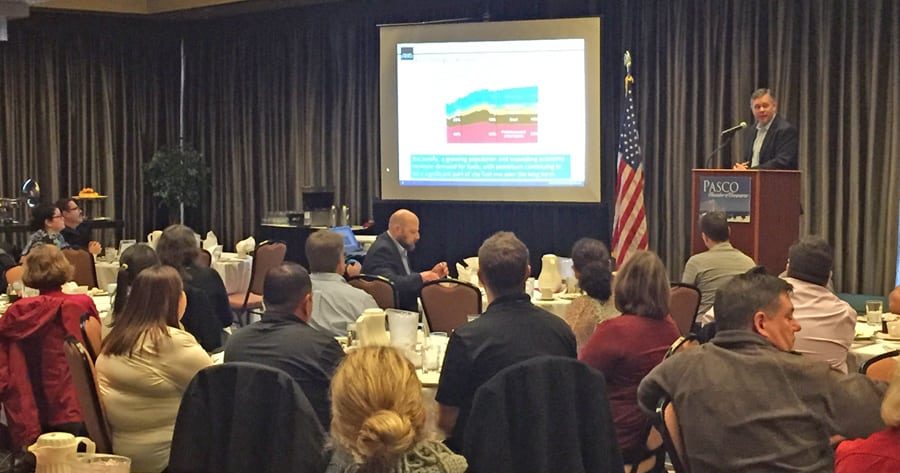
Home » Tesoro official touts benefits of Vancouver oil terminal to region, state
Tesoro official touts benefits of Vancouver oil terminal to region, state

March 14, 2017
A Tesoro official updated the Tri-Cities on plans to build an oil transfer terminal in Vancouver, Washington, during a recent Pasco Chamber of Commerce meeting.
Dan Riley, vice president of government affairs for Tesoro, told those in attendance — employers, community leaders and elected officials — how the project would benefit the Inland Northwest and the entire state’s economy.
Riley said the transfer facility at the Port of Vancouver would receive, but not process or refine, crude oil by rail and load it onto ships bound for refineries in Washington and along the West Coast.
The project is a joint effort between Tesoro Refining and Marketing Company LLC and Savage Companies. The facility would handle 360,000 barrels of crude oil per day by rail.
“This is an exciting project, one that will enhance the energy independence of our state and our region, by displacing the need for foreign crude oil,” Riley said. “We believe we can operate this facility safely and in an environmentally responsible way. Our partners, like BNSF Railway, are also committed to providing the necessary upgrades that will benefit everyone in the Tri-Cities, particularly those in agriculture who depend on safe, efficient and reliable freight rail service.”
Colin Hastings, president of the Pasco Chamber of Commerce, said the Vancouver Energy project is an important economic driver that would help increase rail infrastructure capacity through the Tri-Cities.
“The Inland Northwest would benefit from the investments Vancouver Energy would bring from partners like BNSF. Those rail line upgrades directly affect our ability to ship wheat and other commodities to foreign markets,” he said. “This is not just about Southwest Washington. All of Washington needs private investors like Tesoro, Savage and Vancouver Energy to help fund improvements to our port and rail infrastructure. Every aspect of our state’s economy, from manufacturing to trade, agriculture and aerospace needs this fuel. Vancouver Energy would provide an important role in meeting those needs, while also boosting our state’s trade and infrastructure capacity.”
Hastings said the Riley “helped people better understand our energy needs, and the way we are all connected in our state.”
Local News
KEYWORDS march 2017 pasco chamber of commerce




